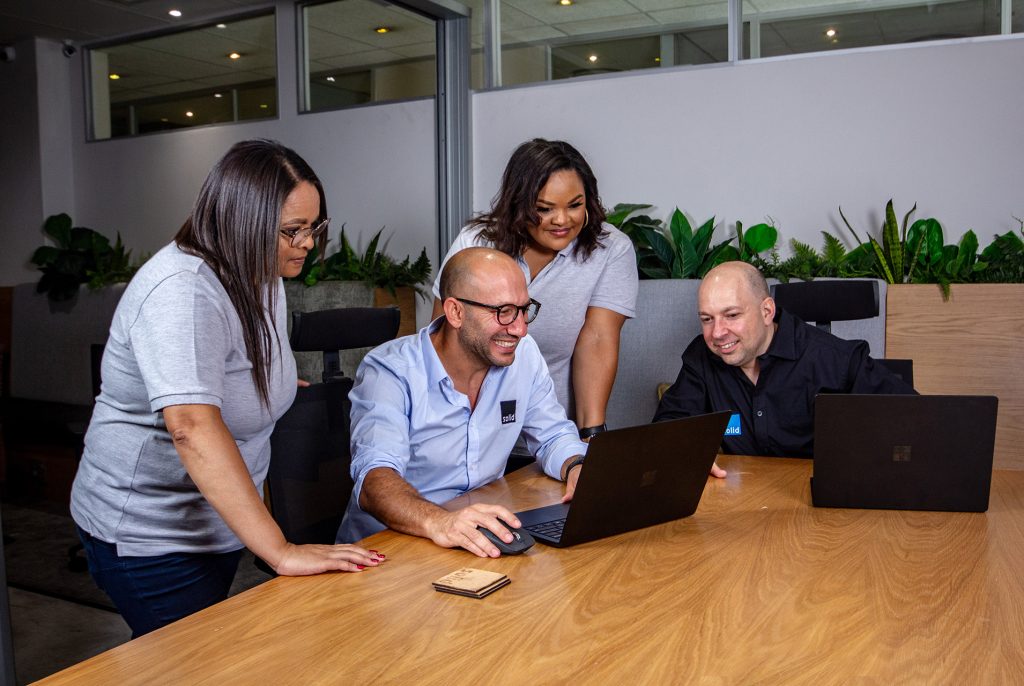
When you started your business, you likely had a very clear idea in mind for what you wanted to achieve, or a problem that you wanted to solve. I know that Daniel and I did when we started our business back in 2003. We knew that businesses wanted to adopt technologies, but that they didn’t have the in-house IT teams or the know-how to make sure that their technologies were implemented in the right ways, were maintained effectively, and were helping them to meet their goals.
But over time, as the minutia of running a company takes over all of your time, it can be easy to lose track of your progress, your goals, and the values that saw you starting your business in the first place. As more and more humans join your teams, each of them with their own roles and goals, the overall goal of your business, the reason you started it all, can become watered down or forgotten.
This is where company culture becomes an invaluable asset to your business. It can help you to pinpoint your values, and help you and your teams to live them every single day.
What Is Company Culture?
Perhaps you’ve heard the term company culture before, but aren’t very familiar with what exactly it is and involves. Company culture is all about the way that you operate, the way that you treat your humans, the values that you stand for, and why you do what you do.
A great company culture sees the people who are a part of your business connecting to the company on a personal level, rather than just working for the sake of doing a job. They feel that what they do makes a real difference, to the business itself, and to its clientele. Because they feel so strongly about what they do and buy into the values that your company prides itself on, they are happy in their positions. And happy humans make for a strong workforce that is proud of what they achieve, and are less likely to feel the need to look elsewhere for a better position, because they are already in a role that gives them a sense of accomplishment.
How Can You Build A Company Culture That Reflects Your Values?
That is an excellent question, and I’m glad you asked it. The process of building up a company culture that you can be proud of isn’t a matter of just sitting around a desk for a few hours and talking it out. It takes significant effort from all sides, but the juice is well worth the squeeze, so to speak. Here are 6 steps that we have found work well for Solid Systems, and which we are hoping will help you to develop a company culture that reflects your unique values and outlooks:
1. Determine What Your Values Are
This can sometimes be more difficult than it sounds. Start from the beginning. Here are a few questions to consider:
- Why did you start your business?
- What drives you to come into work everyday?
- What is it that you do differently from all of your competitors, or what makes you stand out in the market?
- What is it that your clients love about you, and can’t stop raving about?
Once you have answers to these types of questions, you’ll hopefully have a good idea of what it is that makes your company tick, and from there, narrowing this down to what you value in life, and what value you can offer to clients, is a short way away.
2. Get Input And Buy-In From Your Humans
A lot of the time, when businesses start solidifying and understanding their company culture, it’s done in meetings between people who started the business and managers. I know that’s how Daniel and I did it the first time around. We sat down together and we answered the questions above. We looked at Solid Systems as more than just a company, but as a way of life, knowing that what truly brought smiles to our faces was seeing our humans and our clients living their best lives.
But what most companies don’t do is get input from their humans. These are the people who know your business almost as well as you do, who live it every day. They see your customers and your clients. They have a deep understanding of what makes things tick along, what they love about working for you, and what they don’t.
I’m not necessarily saying that every single one of your employees should be involved from the start, but getting input from the start from a few key members of your teams can be fundamental for gaining a great understanding of the values that your humans are currently feeling and living, while sharing pieces of the process throughout with most of your humans will remind them that their opinions are valued and meaningful.
3. Pinpoint Behaviours That Reflect Your Values
Understanding what your values are is one matter, but finding ways to live them is another. Let’s say, for example, that one of the strengths you place great value in is transparency. You want to be the kind of business that your humans and your clients can trust, and transparency is a wonderful way of doing that. But what kind of behaviours encourage transparency? What steps can you take to make sure that your humans are living that value, that your clients are seeing that transparency in their interactions with you?
Using transparency as one example, you could look into incorporating transparent behaviours like these into your company culture:
- Owning up. People make mistakes – it’s trying to hide them that often leads to trust being broken.
- Taking responsibility. Too often people in this world try to pass the buck, not wanting to feel pressured by taking charge of a situation. We want to see people stepping up to the plate and choosing to take on responsibilities, and we want to help them succeed. Because taking responsibility doesn’t mean that you’re going at it alone.
- Clarity and focus. The more clear a scenario is, the easier it is for both humans and clients to understand, and the more likely it is to end in success. This is why it’s important to explain processes, to make sure that there is full understanding, and that efforts are being focused in the right directions.
4. Bring Them To Life Through Rituals
Once you have a clear idea of what behaviours reflect your company values, the next step is making sure that these behaviours are honoured and practiced as part of the work that you do. This is where rituals come in.
These are activities that are regularly practiced by the humans in your business, which reflect a variety of different values. Where I used transparency as an example of a value that might talk to your particular business, when it comes to rituals, I thought I would share a few of the ones that we have found work well over the years.
One of the biggest areas that we value at Solid Systems is connection. Some behaviours which speak to it are open and honest communication, caring about those around you, helping each other to learn and grow. And some of the rituals which speak to these behaviours include:
- Random Acts of Coffee: We encourage our humans to connect over a cup of coffee, catching up on what’s happening in each others’ lives, usually outside the office and for 30 minutes at a time. Even our virtual teams are encouraged to sit down and have video chats over a cup of coffee.
- Eat Lunch Together: In a similar way to sharing a cup of coffee with one of your colleagues, sitting down to a meal with multiple people and connecting for an hour while chatting about your days, your lives, brings a sense of togetherness. That’s why we love coming into the office and being together in one space, sharing a meal and laughing over memories and stories.
- Know Your Neighbour: When people work together in an office, they often end up sitting next to the same person every day, getting to know them well, sharing stories just as part of being in the same space. When your teams are working from their homes, or in different parts of the country, your ‘neighbour’ takes on an entirely different meaning, and getting to know them takes a touch more effort. Which is why we have a ritual of assigning our humans ‘neighbours’ every quarter, and encouraging them to connect over video calls, in person meetings where possible, and just generally getting to know one another a little bit better.
5. Make Them An Intricate Part Of Who You Are
Your values are a huge part of who you are as a business, and your company culture should be too. It should be something that you’re intricately proud of, that your humans feel connected to, and that you not only want to celebrate, but want to share with others. And you should! Make sure that your humans are living your values, and that new humans who join your company over time have a deep understanding of your values and rituals, and are ready to connect to your business as more than just another employee. Because when your humans embrace your company culture, it spreads far and wide, and makes your business the kind of company that people want to work for, and want to work with.
6. Regularly Reflect On Your Values And Your Journey
Company culture isn’t static. As the world changes around you, you are going to find that your values change, that your behaviours change, that what’s unique about your business shifts. And that’s a natural part of the process. But it is why you need to regularly reflect on and re-evaluate your values and your priorities as a business to make sure that your company culture is still in line with where you see yourself in 2, 5 or 10 years’ time.
Go through the process regularly, and loop in different humans each time to ensure that you are focusing on the areas that matter most to your business, while at the same time truly are living your values through the culture that you portray.
Need Some Help Along The Way?
I hate to be that person, but the technologies that your business uses can play a huge role in your company culture, which is why implementing the right tech that is helping your business to not only meet your goals, but help your humans to connect to your company and your passion is critical.
If you are looking for IT consultants or a Managed IT Services Provider to offer guidance and IT support, you’re in the right place. Solid Systems has been helping companies to grow, to meet and exceed their goals, and to see their humans living their best lives for over 20 years. And we would love to see your business, and your people, thriving.
If you’re ready to put technology and humans at the forefront of your business, then don’t hesitate to get in touch with us, or book a consult today.
Popular Searches
- Cyber Security Do’s And Don’ts
- Types of Threats in Network Security
- Cloud Security Best Practices
- Importance of IT Security
- Cyber Security Threats To The Financial Sector
- Cybersecurity in Banking
- Man in the Middle Attack
- Types Of Network Security
- Advantages of Disaster Recovery Plans
- Popi Act Compliance Checklist
- Cyber Security Tips for Employees
- Phishing Attacks





